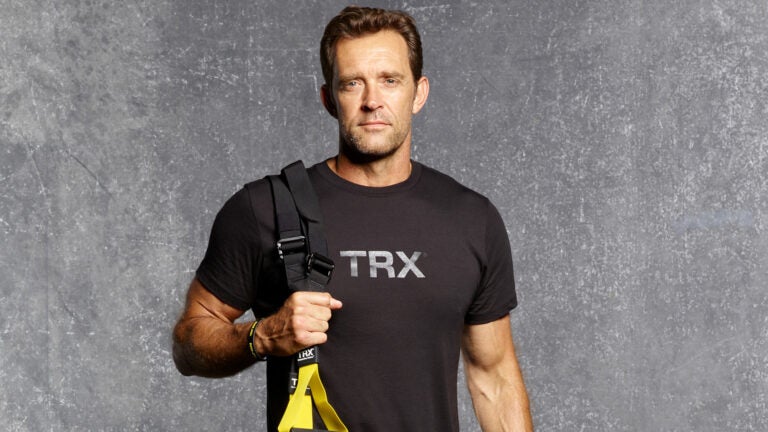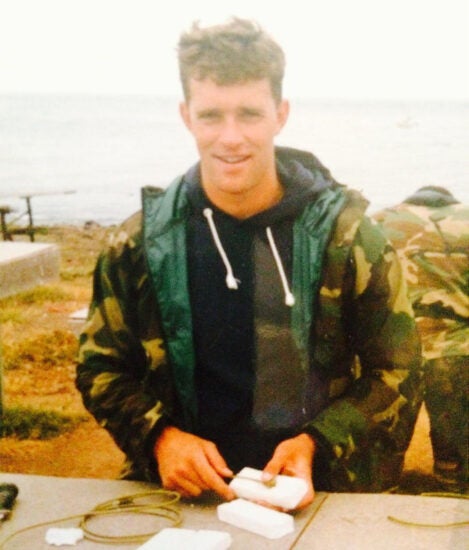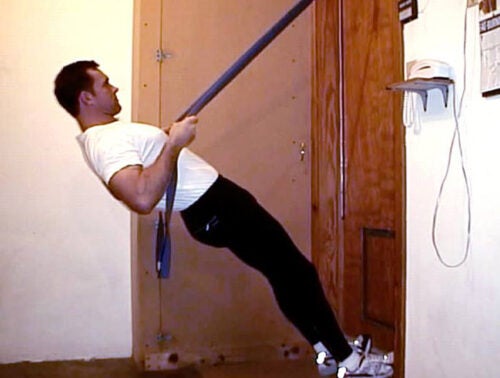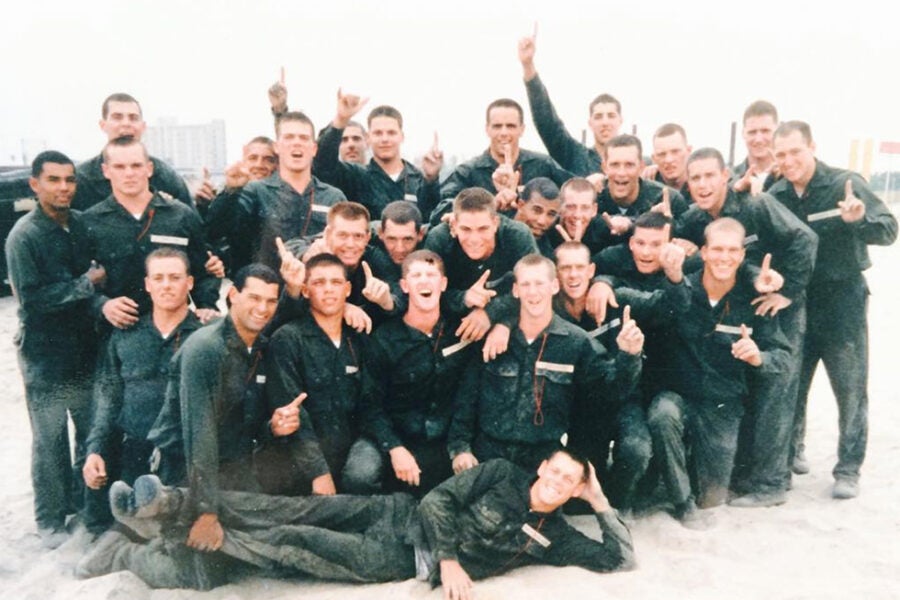
From US Navy SEAL to successful fitness entrepreneur
It might seem an unlikely career choice for a history graduate, but alumnus Randy Hetrick is the successful entrepreneur behind two leading physical training start-ups: TRX Training and OutFit Training. His path to fitness entrepreneurship took several unexpected twists and turns after earning his degree from the USC Dornsife College of Letters, Arts and Sciences in 1987 — including serving as a U.S. Navy SEAL and working as a lobbyist on Capitol Hill.
So, how did he get where he is today?
Born Trojan on a path to become a fitness entrepreneur
Hetrick’s decision to attend USC was strongly influenced by his family.
“My dad had to transfer and never got to finish his USC education, so he was very excited about me going there,” Hetrick says. “I grew up watching the Trojans, so USC was a big part of our family history.”

Following his parents’ divorce, Hetrick grew up between his parents’ homes in the Southern California beach towns of Corona del Mar and Huntington Beach. With his father in dental school and his mother working as a flight attendant, money was tight. However, his mother’s job allowed mother and son to travel for free to the United Kingdom, where they toured the country by bus and train, visiting the castles that sparked Hetrick’s lifelong love of history.
Later, his stepfather’s encouragement to pursue a liberal arts education inspired Hetrick to join USC Dornsife as a history major — a choice that aligned with his burgeoning interest in contemporary U.S. and military history and politics.
While at USC, Hetrick pledged a fraternity, participated in every opportunity available and benefitted from an incredible mentor: USC President Emeritus John Hubbard, a WWII U.S. Navy bomber pilot and recipient of a Distinguished Flying Cross. “Dr Hubbard cemented my passion for history, graded me hard and pushed me,” Hetrick says.
Hubbard wasn’t the first to show the young Hetrick “tough love.” He says his grandfather, who grew up in Depression-era Kansas, had an old-school “knock you down to build you up” approach to parenting.
“That bled through to my dad, a dentist, who had a similar way of developing toughness in his kid,” Hetrick said. “At the time, I didn’t appreciate it, but it created a hell of a chip on my shoulder to prove myself — to him and whoever else was around.”
Hetrick says this led him to engage in a series of “hard and thankless” sports, starting with wrestling, which he began practicing in high school. At USC, he began rowing, which he credits with teaching him teamwork.
These challenging sports became thematic of his life, he says. Unwittingly, he was also laying down the ideal groundwork for acceptance into the Navy SEALs.
“I discovered later that the sports that are the best for SEAL selection are endurance sports with a high misery quotient and low crowd approval,” he said. “Wrestling definitely falls into that category. I’ve heard many wrestling coaches say that after wrestling, everything else in life is easy.”
Alumnus aspires to serve as a Navy SEAL
Inspired by a family tradition of military service that stretches back to the Civil War, Hetrick set his sights on becoming a SEAL after graduating with his bachelor’s degree in 1987.

“I wanted to set the bar really high, and so my sole selection criteria, which is preposterous in retrospect, was to find the Special Operations unit with the highest selection failure rate.”
When he discovered that the SEALs’ attrition rate is 85%, Hetrick knew that was where he wanted to be. However, the road to becoming a SEAL was not an easy one.
“It involved a lot of hammering on doors. Back then, there was no e-mail, so it meant a lot of letters and telephone calls and just being persistent. I wanted to go in as an officer, and there were very few opportunities.”
In the end, it was the friendships that Hetrick had developed through his USC fraternity that provided the contacts that helped him achieve his dream. “USC opened every door you can imagine,” he says.
Hetrick attended Officer Candidate School and began SEAL training in spring 1988, enduring the infamous “Hell Week” — an experience Hetrick describes as “a week of round-the-clock torture, with only 15 minutes sleep a day for five to six days straight.” Hetrick says he got through it thanks to “dumb luck and hard- headedness.
“You’ve got to be lucky not to get hurt, and then you’ve got to be thick-skinned and determined not to let your mind fail you,” he says. “That was my specialty and has continued to be as an entrepreneur. It’s a propensity for biting down on my mouthpiece and grinding through.”
Hetrick’s remarkably positive outlook still enables him to forgive himself if things don’t work out and to keep moving forward.
“I don’t really believe in failure,” he says. “I obviously understand it, because throughout my career I have undershot my goals many times. But I have never viewed that as failure. It’s all part of this process of trial and error, improvement and retrial.
“So, it never really occurred to me that I might fail. That’s just not how my mind is wired and that’s continued into my entrepreneurial career.”
From counter-terror to Capitol Hill to inventing TRX
Hetrick’s philosophy also enabled him to thrive in his career as a Navy SEAL. Beginning with platoon deployments to Southeast Asia and Africa, Hetrick then earned a master’s degree in national security affairs at the Naval Postgraduate School. After graduating in 1994, he was selected to join the SEAL’s elite counter-terror unit.
Three years later, his career took a significant detour when he moved to Washington, D.C. to serve as the principal lobbyist on Capitol Hill for U.S. Special Operations Command (USSOCOM). During his two-year stint in the role, he pursued funding for a portfolio of more than $1.3 billion in critical SOCOM initiatives.
Returning to operational service, he finished his 14-year military career by returning to the special missions unit as a squadron commander when the birth of his first son, Harrison, provided the impetus to pursue his dream of going to business school.
Hetrick launched TRX Training from his garage in 2004, one year after earning his MBA from Stanford University. The company has grown from a bootstrap start-up to a leading global physical training brand.

The TRX Suspension Trainer was born out of necessity while Hetrick was deployed without training equipment on a counter-piracy operation in Southeast Asia. Searching for a solution, he created a contraption using his jiu-jutsu belt and some surplus nylon webbing. “I tied a knot in it, threw it over a door, leaned back against gravity and lifted my body. The possibilities opened up like a flower.” A global fitness brand was born.
Three years ago, Hetrick launched his second startup, OutFit Training, a technology-enabled outdoor mobile fitness service, which he describes as “basically like Uber for fitness.”
What next? Hetrick, who regularly teaches entrepreneurship at USC Marshall School of Business and at Stanford University, hopes to transition out of day-to-day operations in the next five years, shifting gears into board roles, writing, and teaching and mentoring entrepreneurs and other business leaders — while also riding his longboard at California’s San Onofre State Beach.
“I want to share the lessons I learned, most of which were learned the hard way,” he says. “If I can help folks coming up the ladder avoid those potholes and learn what I did, but with a little less pain, then I’ll be happy.”
And Harrison Hetrick? The son is now following in his father’s footsteps: After graduating from USC Dornsife in 2024 with a BA in international relations (global business), he graduated Officer Candidate School and received orders to Basic Underwater Demolition/SEAL with ambitions to become a Navy SEAL.
See Randy Hetrick’s journey from childhood to Trojan to Navy SEAL to successful fitness entrepreneur and watch as he explains how he got there through USC Dornsife Magazine’s PATHWAYS feature
Q & A with Randy Hetrick on “Hell Week”
What happens during the U.S. Navy SEALS infamous training known as “Hell Week”?
RH: “You’re in the surf without a wetsuit day and night, ‘cooling off.’ Mental willpower and the ability to tolerate the cold are the things that, as much as anything else, separate those who make it from those who don’t. In addition, you’re only getting about 15 minutes of sleep and running more than 10 miles a day in the soft sand with boats on your head, carrying logs and doing 5 a.m. hellacious calisthenics every morning with the instructors constantly on you like wolves. There is rarely a kind word said, but there is a lot of dark humor to appreciate.”
How do you cope?
RH: “You just have to let it roll off you like water off a duck’s back. You’ve got to keep that singular focus on the prize at the end, focus on helping your teammates, and not let that stuff get to you. So, you need a real toughness of body, but also of mind. A lot of great athletes don’t make it and a lot of guys who you might not expect to make it, do. That’s where the combination of determination and an ability to stay positive while suffering is the differentiator.”
What is the purpose of Hell Week?
RH: “The main purpose of Hell Week is to find people who can get themselves comfortable in the world’s least comfortable circumstances. If you can keep your wits about you, think clearly and communicate to others while being heinously uncomfortable, scared and exhausted, then you’re the raw material the U.S. Navy wants to sculpt into a SEAL.”

Randy Hetrick’s Tips for Success
-
Maximize your education
- Take your university educational experience seriously from the first year.
- Have fun — this is a unique time in your life and once it’s gone, it’s very hard to recreate.
- Engage in every opportunity you can. Pick your lane, get in it and squeeze the juice out of it.
- Make lots of friends and stay in touch— USC’s Trojan Family offers an incredibly valuable opportunity to build your personal and professional network at a deep and meaningful level.
-
Cultivate Mental Strength
- Own your stuff (good and bad) and be your own harshest critic — it sucks the wind out of other people’s ability or interest in criticizing you.
- But don’t be too self-critical — even if you’ve given something your best shot, sometimes it’s just not going to work out. That’s not a failure, it’s an opportunity to learn how you could have done better. We learn our biggest lessons from our biggest mistakes.
- Be philosophical about life — it’s full of ups and downs. Try to enjoy the ride while you’re up and learn something when you’re down, realizing neither of them will last. Try never to let any of it leave a scar, whether you win or lose. It’s just all part of life.
-
Develop physical fitness
- The key to being physically fit is to keep trying. You’re going to have highs and lows, but it’s consistency over time that counts. So, if you fall off the wagon, take the first opportunity to get back on and start over. Physical fitness is a journey without an end.
- Because you’re less likely to do things that feel like drudgery, find the things you like to do and focus mainly on those. The more fun you’re having, the less it feels like work — just like everything else in life.
-
Cultivate career skills
- Landing a job often involves some luck, but good players who prepare well make their own luck. One way to do that is by cultivating a powerful network. USC opened that up for me and it can for you, too.
- There are always opportunities to learn new skills and try new ventures that might take your life in a new, previously unimagined direction. If you’re bored or unhappy with where you are, what have you got to lose? Pursue your bliss elsewhere by creating a life that inspires you.